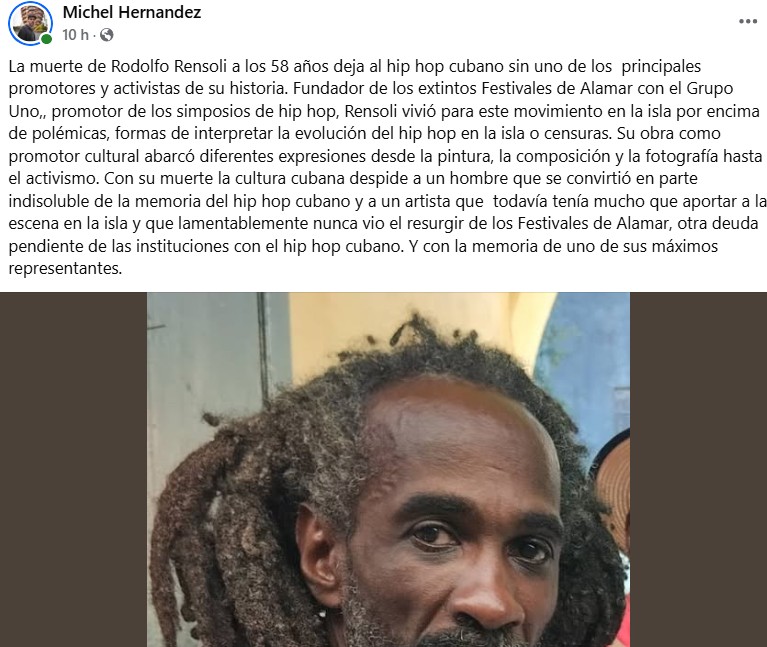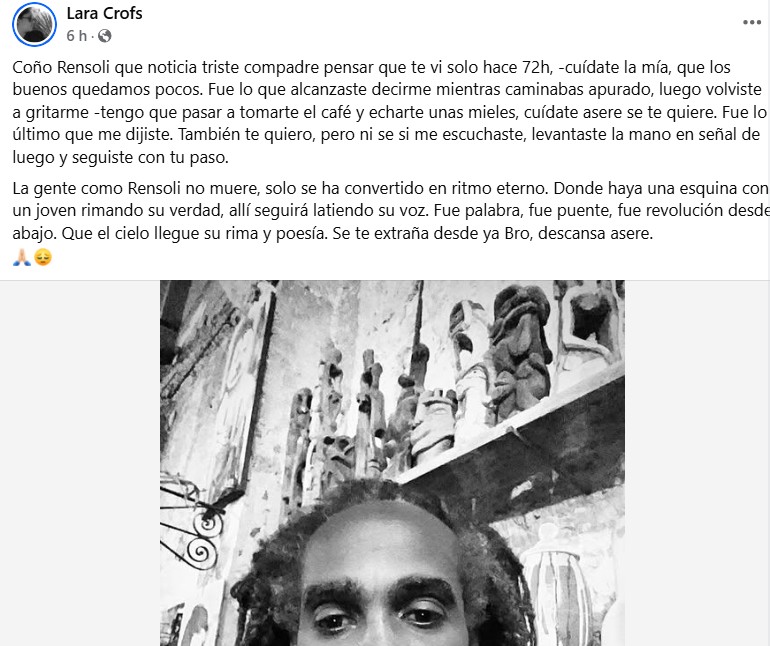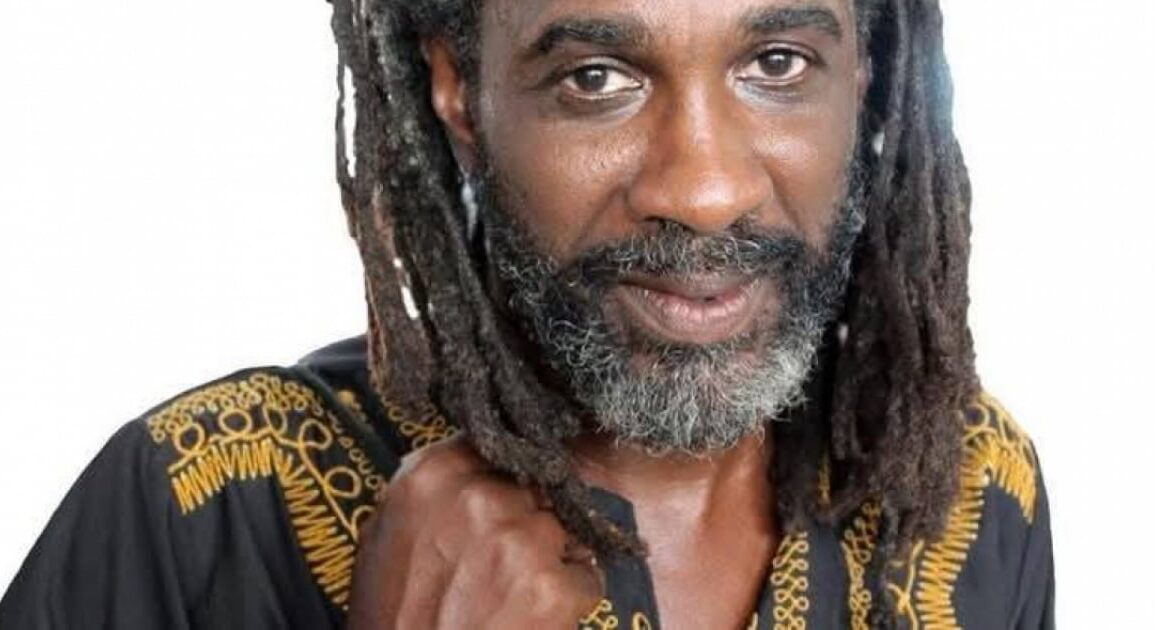Last Friday, Rodolfo Antonio Rensoli Medina passed away in Havana. He was an indispensable figure in the history of hip hop in Cuba, a cultural promoter, visual artist, and founder of the first rap festival on the island. He was 58 years old.
His death has sparked a wave of reactions among artists, activists, journalists, and citizens on social media, many of whom not only mourn the loss but also the censorship he faced during his life from the country’s cultural institutions.
Rensoli was not just a facilitator; he was a visionary who, from the margins of the system, paved the way for a generation of mostly young, Black, impoverished individuals without access to traditional cultural circuits.
In 1995, he organized the First Cuban Rap Festival at the Casa de la Cultura in the Antonio Guiteras neighborhood, in East Havana. He did it without significant resources but with a deep sense of social commitment.
That first edition, where groups like Primera Base won awards, became the spark of a movement that, for at least six years, found refuge in the Alamar Amphitheater.
That space attracted hundreds of young people who were not seeking fame, but rather wanted to share their reality without embellishment or censorship.
Born on June 13, 1966, in Guanabacoa, Rensoli came from the rock scene and the “friki” universe—also marginalized—and from there, he built bridges towards a culture that many in power labeled as “foreign” or “dangerous.”
He was a founding member of the collective Grupo Uno, the organizational and spiritual force behind the festival, and one of the first to understand that hip hop in Cuba could be much more than mere copy or imitation: it could be identity, a means of denunciation, and a tool for social transformation.
The price of independence
But their commitment to a critical and autonomous culture came at a price.
Rensoli faced institutional silence, censorship, and the usurpation of his work. Testimonies gathered from social media and independent press indicate that, in light of the growing reach of the rap festival in Alamar – which even hosted international figures like Black Star – the Asociación Hermanos Saíz (AHS) and the Ministry of Culture intervened to take over the event.
The government created the Cuban Rap Agency, an entity that, for many artists, served as a mechanism to co-opt, monitor, and control the discourse of Cuban hip hop.
“They usurped the festival organized by Grupo Uno to control and censor the lyrics being sung. Cuban rappers were no longer imitating American rappers and were starting to adopt their own identity, delving deeper into questioning the political and social reality of the Island,” wrote journalist Mauricio Mendoza in Árbol Invertido.
Other users, like rapper Coco Man, have been more blunt: “You, damn shameless ones, who took everything from him (…) Now that he’s dead, that’s when you put him out there.”
Following the news of his passing, the newspaper Juventud Rebelde dedicated an obituary to him, highlighting his work as an organizer of rap festivals as well as his academic achievements.
Rensoli held a degree in Cultural Heritage Management and was a specialist at the Provincial Center for Plastic Arts and Design in Havana, as well as being an Ibero-American Comics Award winner.
A living legacy in the corners
In addition to being a cultural promoter, Rensoli was a visual artist, poet, educator, and radio host. In recent years, he hosted a weekly program on Radio Cadena Habana and was a finalist in the recent Humor Biennial.
But his true legacy lies in those corners where improvisation still thrives, in the lyrics that boldly call out injustices, and in every young person who has ever found in rap a way to exist with dignity.
The journalist Michel Hernández remembers him as someone who lived for the hip hop movement in Cuba, rising above controversies, censorship, and differing interpretations of the genre’s evolution.
“An artist who still had much to contribute to the scene on the Island and who unfortunately never witnessed the resurgence of the Alamar Festivals, another pending obligation of the institutions to Cuban hip hop. And to the memory of one of its greatest representatives,” he stated on Facebook.

Rensoli’s work as a cultural promoter encompassed various expressions, from painting and composition to photography and activism.
Messages of condolence are multiplying on social media
“And to think that this gentleman was the founder of urban movement on the Island, and very few from the old school remember him, and as for those from the new school, it’s another story. Since I was a child, I witnessed his comings and goings while organizing the rap festival in Alamar, my neighborhood,” expressed Luis Rubio Abella III.
“When there was nothing, neither the Internet nor social networks existed, in a time when even speaking was prohibited, when the Aldeanos did not exist, when people sang with Russian wired microphones and played music on cassette tapes, like a rising sun defying the world, there he was. The first to break the ice, to teach a generation to dream, and to convey love through art,” detailed Asuan Cuesta.
“The light of the lighthouse that illuminated our path is gone. The restless and constant Afro-declamatory and Afro-poetic voice that sought to recreate our black world in white spaces. He made them listen to us. To understand us. Thank you, Rodolfo Rensoli, for protecting us, training us, defending us, listening to us, for mentoring us and guiding us,” wrote rapper Reynor Hernández Fernández.
“People like Rensoli don’t die; they simply become an eternal rhythm. Wherever there’s a corner with a young person rhyming their truth, their voice will continue to beat there. It was a word, it was a bridge, it was a revolution from below,” said activist Lara Crofs.

For many, the death of Rodolfo Rensoli represents not only the end of an era but also an uncomfortable reminder for a system that, far from supporting it, deliberately limited the growth of one of the most powerful cultural movements to emerge on the Island in recent decades.
Frequently Asked Questions about Rodolfo Rensoli and Hip Hop in Cuba
Who was Rodolfo Rensoli and what was his contribution to hip hop in Cuba?
Rodolfo Rensoli was a key figure in the history of hip hop in Cuba. He was a cultural promoter, visual artist, and the founder of the first rap festival on the island in 1995. Through his work, he paved the way for young artists, providing them with a space to express their realities without censorship.
How was Rodolfo Rensoli censored by cultural institutions in Cuba?
Rensoli faced censorship and institutional silence due to his commitment to a critical and autonomous culture. The rap festival he organized was usurped by the Asociación Hermanos Saíz and the Ministry of Culture, who created the Cuban Rap Agency to control the movement and censor lyrics that questioned the political and social reality of the island.
What is Rodolfo Rensoli’s legacy in the Cuban hip hop movement?
The legacy of Rensoli lies in his lasting influence on Cuban hip hop, especially in his ability to serve as a tool for social criticism and transformation. His work continues to inspire young artists who seek to express their truths and fight for their own identity within the genre.
How does the political and social situation in Cuba reflect in the work of Rodolfo Rensoli?
Rensoli’s work was a direct response to the conditions of marginalization and censorship faced by many young people in Cuba. His rap festivals provided a space for artists to challenge official narratives and express their experiences and frustrations with the Cuban political system.
This post was originally published on this site be sure to check out more of their content.







